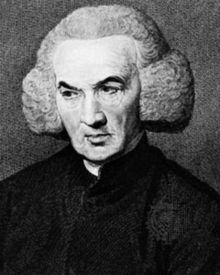Richard Price (philosopher)
Richard Price (born February 23, 1723 in Llangeinor , Glamorgan , Wales , † April 19, 1791 in London , England ) was a Welsh ethical philosopher , preacher of the English dissenters and an active pamphlet writer in the American Revolution . He was in contact with writers of the United States Constitution . He spent most of his life as a pastor at Newington Green Unitarian Church , where he may have met the person he has most influenced: Mary Wollstonecraft , who used his ideas in egalitarianism in the struggle for women's rights in the French Revolution . In addition to his work as a political philosopher , he was also active in the Royal Society .
Live and act
Richard Price was born the son of a dissenter pastor in Llangeinor , Glamorgan . He received private tuition and in a school for dissenters in London he became chaplain and companion of his master in Stoke Newington , which is formerly near and now in inner London. In 1757 his master and uncle died and he married Sarah Blundell of Leicestershire . A year later the family moved to Newington Green in north London, to a house that was a hundred years old at the time. Richard Price became a pastor in Newington Green Unitarian Church, a congregation that continues to this day and is one of the oldest Unitarian congregations in England.
On November 4, 1789, on the 101st anniversary of the beginning of the Glorious Revolution , Price delivered a sermon entitled “ A Discourse on the Love of our Country ”, causing a public controversy over the political significance of the French Revolution , the became known as " Revolution Controversy ". In the homily, Price drew parallels between the "Glorious Revolution" of 1688 (which the London Revolution Society celebrated with a dinner on the same day) and the French Revolution of 1789, claiming that the former promoted and promoted the ideas of the Enlightenment so that the events of 1789 paved the way. He put the then controversial revolutionary events in France in line with the English Revolution of the 17th century, which enjoyed a largely positive reputation in the political culture of Great Britain. Price found in Edmund Burke an important critic of this view of history.
In the Church and in his home, Price was welcomed by United States founding fathers such as Benjamin Franklin , Thomas Paine, and Thomas Jefferson , other American politicians such as John Adams , who later became second President of the United States , British politicians such as George Lyttelton and Prime Minister William Pitt , Visited philosophers like David Hume , supporters of the French Revolution and other political guests. Price was on good terms with his neighbors and community members. In 1782 he was elected to the American Academy of Arts and Sciences .
Together with his neighbors James Burgh and Thomas Rogers , he organized a dinner together every day, which changed from house to house.
See also
- Josephspfennig ( miracle of compound interest ), Price's thought experiment on compound interest
Web links
- David McNaughton: Richard Price. In: Edward N. Zalta (Ed.): Stanford Encyclopedia of Philosophy .
- openlibrary.org: Observations on reversionary payments 1771 , accessed October 20, 2012
Individual evidence
- ↑ Entry on Price; Richard (1723-1791) in the Archives of the Royal Society , London
| personal data | |
|---|---|
| SURNAME | Price, Richard |
| BRIEF DESCRIPTION | British ethical philosopher, preacher to the English Dissenters and an active pamphlet writer in the American Revolution |
| DATE OF BIRTH | February 23, 1723 |
| PLACE OF BIRTH | Llangeinor , glamorgan |
| DATE OF DEATH | April 19, 1791 |
| Place of death | London , England |

